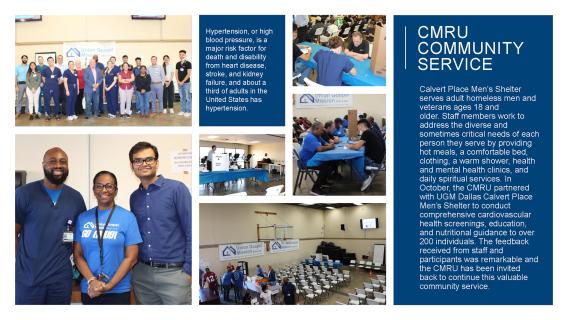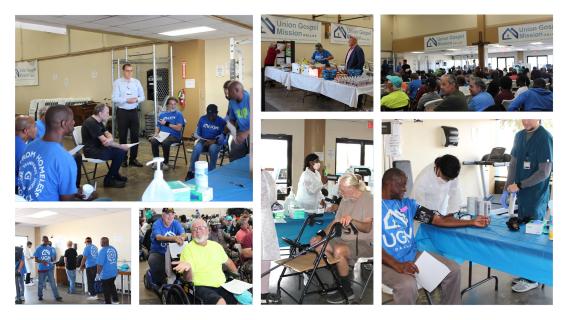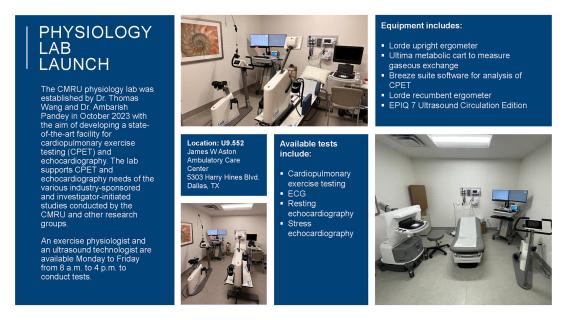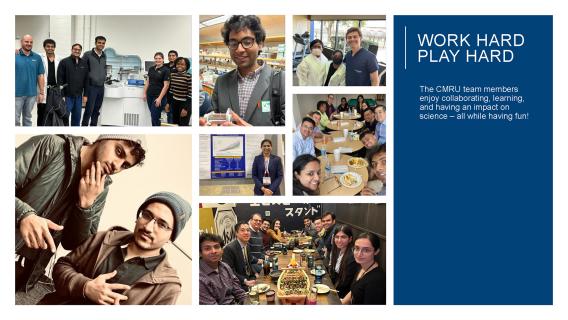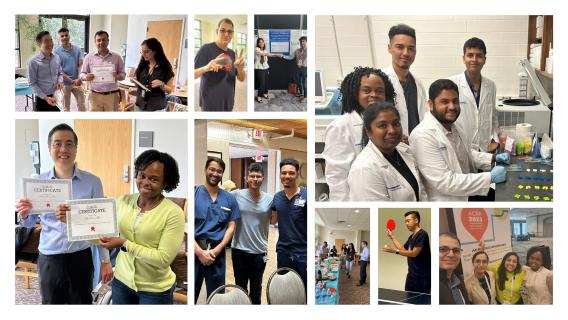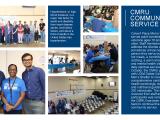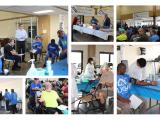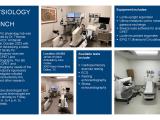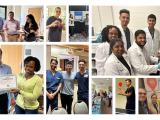News and Honors
August 27, 2025
Team Dinner
 Group photo of the lab members around a restaurant table
Group photo of the lab members around a restaurant table The CMRU Team Dinner was a wonderful evening of laughter, camaraderie, and celebration. The event brought the team together over delicious food and warm conversation. Colleagues enjoyed connecting outside the lab, sharing stories, and strengthening relationships.
The night highlighted the strong bonds and collaborative spirit that define the CMRU team. It was truly an evening of good food, great company, and lasting memories.
With appreciation,
Drs. Wang and Pandey
April 29, 2025
Learning to Learn! - Applying Implementation and Behavioral Economic Science to Improve Cardiometabolic Care
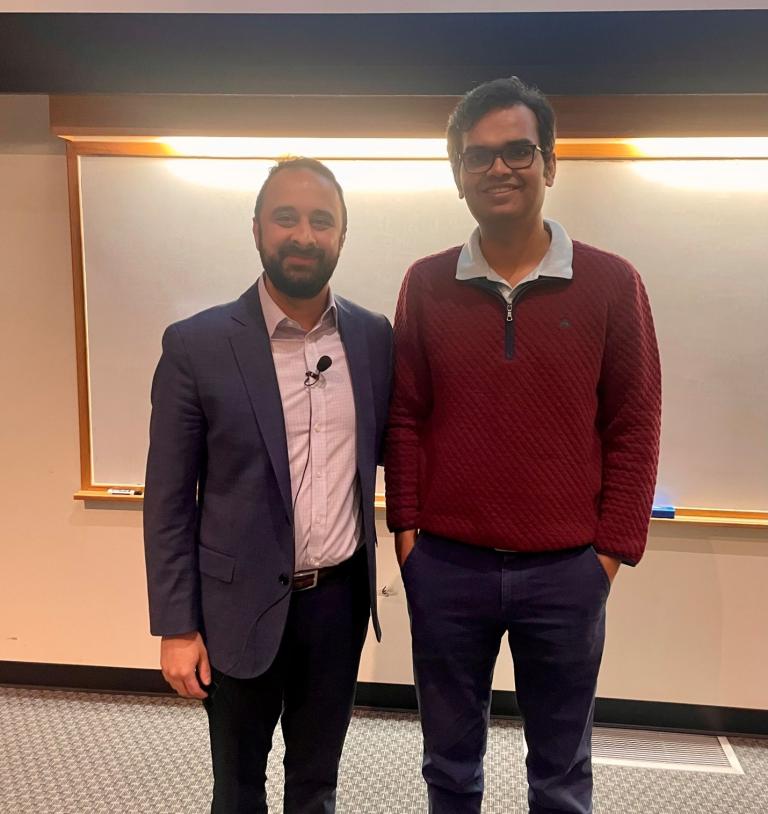 Left to right: Dr.Bhatt and Dr.Pandey
Left to right: Dr.Bhatt and Dr.Pandey On April 29, 2025, the Cardiometabolic Research Unit (CMRU) welcomed Dr. Ankeet S. Bhatt for a lecture on advancing cardiometabolic care through implementation and behavioral economic science. Dr. Bhatt, a cardiologist and clinical investigator at the Kaiser Permanente San Francisco Medical Center and Division of Research, also holds an adjunct role at Stanford and has led over 135 peer-reviewed publications. His background includes a joint MD/MBA from the University of Connecticut, residency at Duke, fellowships at Brigham and Women’s Hospital/Harvard Medical School, and a master’s in epidemiology from Harvard T.H. Chan School of Public Health.
Dr. Bhatt highlighted the persistent gap between evidence-based therapies and their real-world use in conditions like heart failure, diabetes, and kidney disease. He discussed the IMPLEMENT-HF study, which showed that a virtual care team-guided approach significantly improved the use of guideline-directed medical therapy (GDMT) for hospitalized heart failure patients, without increasing hospital stays. However, benefits varied across groups, and the study was limited by its short-term focus and lack of long-term outcome assessment. He is now conducting a larger follow-on trial within the Kaiser Permanente integrated healthcare delivery system
The lecture also explored how behavioral science can drive health improvements through subtle “nudges” that influence patient and provider decisions. Dr. Bhatt cited examples like the NUDGE-FLU trial in Denmark, where behaviorally informed letters increased influenza vaccination rates and influenced national health strategies, including a large ongoing trial KP-VACCINATE being conducted in the US. He concluded by advocating for integrating implementation and behavioral sciences, precision approaches, and innovative strategies like gamification to achieve scalable, sustained improvements in cardiometabolic health.
January 22, 2025
Cardiometabolic Lecture Series with Dr. Naveed Sattar
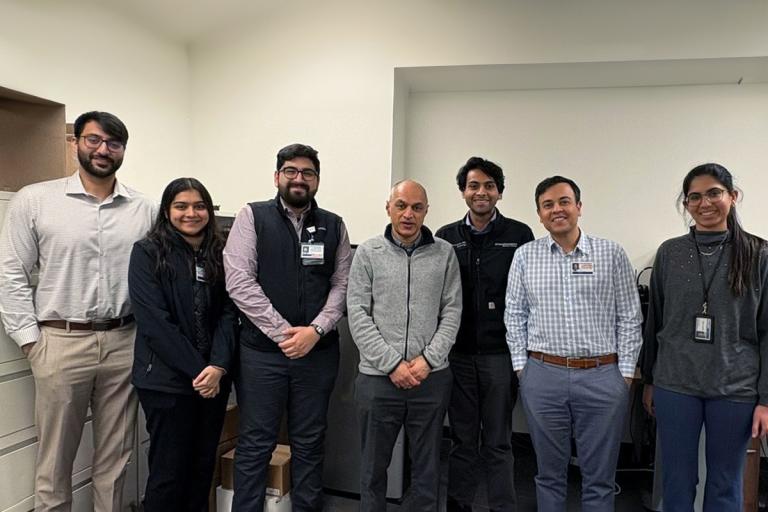 Left to Right: Drs Rizvi, Dhruve, Pauta, Sattar, Subramanian, Keshvani and Patel
Left to Right: Drs Rizvi, Dhruve, Pauta, Sattar, Subramanian, Keshvani and Patel Professor Naveed Sattar delivered a comprehensive lecture on obesity and cardiometabolic disease at the 4th Cardiometabolic Research Lecture Series. The presentation explored the complex interplay between cardiovascular, kidney, and metabolic diseases, highlighting the paradoxical trend of reduced cardiovascular deaths alongside increasing obesity rates. Sattar discussed multiple pathophysiological mechanisms related to obesity, emphasizing the multifaceted nature of these conditions.
The lecture covered various interventions and their impacts on cardiometabolic health. Population-level changes, such as lower LDL cholesterol levels and reduced smoking rates, were noted. Sattar also highlighted the increased use of medications for inflammatory conditions and improved survival rates in diabetes, chronic kidney disease, and heart failure, albeit with a concurrent rise in obesity-related issues.
A significant portion of the talk focused on the benefits of intentional weight loss. Sattar presented evidence showing remarkable improvements in various health outcomes, including type 2 diabetes remission (50-93% of cases), blood pressure reduction, improved lipid profiles, and cardiovascular benefits such as prevention of myocardial infarction and stroke. The lecture also touched on positive effects of weight loss on chronic kidney disease, sleep apnea, osteoarthritis, and even long COVID. Looking to the future, Sattar emphasized the need for better holistic risk assessment, promotion of lifestyle changes, consideration of targeted drug interventions, and advocacy for environmental changes to address the obesity epidemic.
The lecture, attended by over 100 clinician scientists and researchers, sparked engaging discussions during the Q&A session, reflecting the high level of interest in this rapidly evolving field of cardiometabolic research.
View Lecture Recording | Passcode: .2b02r5l
December 10, 2024
Value-Based Care Is Key to Bringing Cardiology Breakthroughs to Those Who Will Benefit Most

Drs. Pandey and Keshvani of the CMRU participated in the prestigious "Value-Based Care Advances in Cardiology" event, held on December 10, 2024, in Dallas, Texas. Organized by The American Journal of Managed Care (AJMC) in collaboration with Optum, the event featured esteemed faculty from the University of Texas (UT) and various Optum subsidiaries. The discussions, presented at the Institute for Value-Based Medicine (IVBM) event, highlighted innovative approaches in cardiology care, emphasizing value-based strategies to improve patient outcomes and address disparities.
This distinguished, in-person gathering provided a platform for leading experts to engage in discussions on innovative value-based approaches in cardiology. The agenda focused on critical issues, including reducing healthcare disparities, enhancing patient outcomes, and integrating advanced care models. Key topics included value-based cardiology care, remote patient monitoring for heart failure, cardiac rehabilitation, and the use of risk scores and biomarkers for heart failure prevention in diabetic patients. The event also featured a networking reception and a panel discussion to consolidate key insights and best practices.
Prominent participants included event co-chairs Ken Cohen, MD, FACP, Executive Director of Translational Research at Optum Health, and Ambarish Pandey, MD, MSCS, Associate Professor at UT Southwestern Medical Center. Additional distinguished speakers and panelists included Shreya Rao, MD, MPH, who explored healthcare disparities in cardiology; Michael Almaleh, MD, FACC, who discussed remote patient monitoring for heart failure management; and Neil Keshvani, MD, who emphasized the importance of cardiac rehabilitation as a value-based care strategy. The event culminated in a panel discussion, moderated by Dr. Cohen, where experts shared their perspectives on advancing cardiology care through value-based methodologies.
November 21, 2024
Cardiometabolic Lecture Series with Dr. Rajiv Agarwal
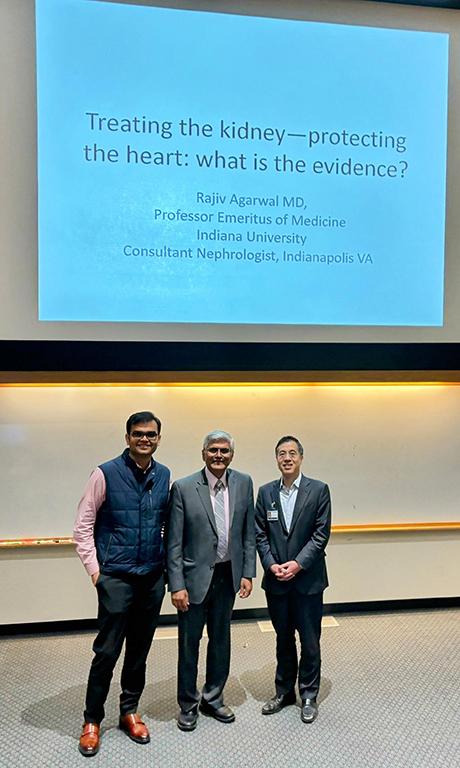 Left to Right: Drs. Ambarish Pandey, Rajiv Agarwal, and Thomas Wang
Left to Right: Drs. Ambarish Pandey, Rajiv Agarwal, and Thomas Wang On November 21, 2024, the CMRU hosted a landmark lecture in its Cardiometabolic Research series, focusing on the critical intersection of kidney and heart health. The event, titled "Treating the kidney—protecting the heart: what is the evidence?" featured renowned nephrologist Dr. Rajiv Agarwal as the guest lecturer. Dr. Agarwal, a distinguished Professor of Medicine at Indiana University, delivered an insightful presentation to an audience of clinician scientists and researchers at UT Southwestern Medical Center. With over 450 research papers to his name and continuous NIH funding since 2003, Dr. Agarwal brought a wealth of expertise to the lecture.
Key Highlights of the Lecture
Dr. Agarwal's presentation covered several crucial aspects:
- A brief history of cardiac disease in Chronic Kidney Disease (CKD)
- Exploration of potential pathways linking kidney injury to cardiac damage
- The intricate relationship between CKD and cardiovascular disease (CVD)
Significant Takeaways
The lecture emphasized several important points:
- The strong association between CKD and CVD, with worse cardiovascular outcomes in CKD patients
- The plausible but yet unproven cause-effect relationship between CKD and CVD
- The role of kidney-produced molecules in altering cardiac function, offering hope for future discoveries
- Emerging therapies showing promise in modifying CVD in CKD patients
- The importance of early detection through urine albumin-to-creatinine ratio (UACR) measurement and timely treatment in managing cardiovascular risk in CKD patients
November 12, 2024
Elviche Lenou accepting the "Best Research Billing Compliance - Team Award"
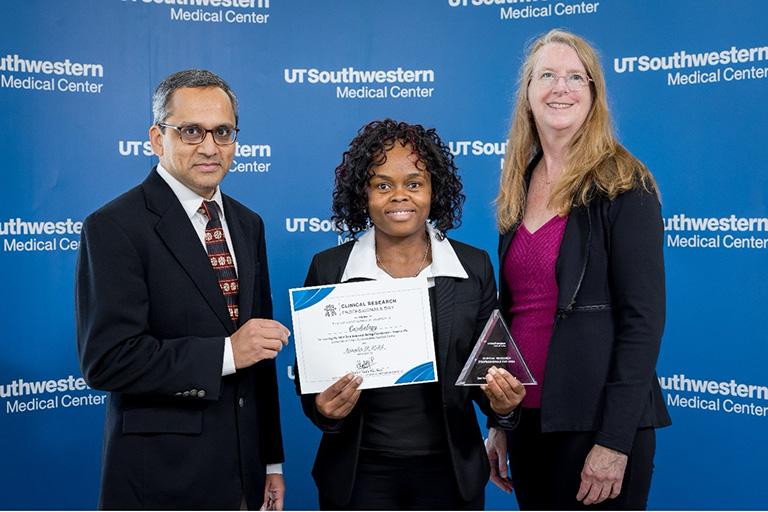 Elviche Lenou had the honor of jointly accepting the "Best Research Billing Compliance - Team Award"
Elviche Lenou had the honor of jointly accepting the "Best Research Billing Compliance - Team Award" Heartfelt congratulations!
Our own Elviche Lenou, B.S., M.S., Senior Research Associate at CMRU, had the honor of jointly accepting the "Best Research Billing Compliance - Team Award" on behalf of Cardiology at UT Southwestern's Clinical Research Professionals Day.
This award recognizes outstanding research staff for exceptional contributions in clinical research, specifically honoring excellence in billing accuracy. The selection was based on billing compliance data from September 2023 to August 2024, requiring a minimum of 2,000 Research Billing Reviews completed.
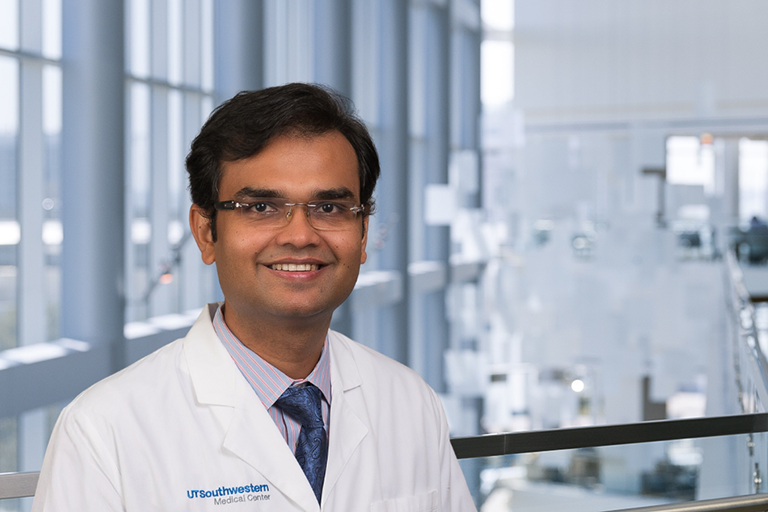
October 28, 2024
AI Tool Predicts Heart Failure Risk in Diabetic Patients
Researchers at UT Southwestern Medical Center have created a machine learning model capable of identifying patients with diabetic cardiomyopathy. This heart condition, marked by structural and functional abnormalities, increases the risk of heart failure. Published in the European Journal of Heart Failure, the study presents a data-driven approach to detect high-risk diabetic cardiomyopathy phenotypes, facilitating early interventions to prevent heart failure in this at-risk group.
“This research is noteworthy because it uses machine learning to provide a comprehensive characterization of diabetic cardiomyopathy – a condition that has lacked a consensus definition – and identifies a high-risk phenotype that could guide more targeted heart failure prevention strategies in patients with diabetes,” said Associate Professor Ambarish Pandey, M.D., M.S.C.S.
By offering a novel method to identify patients at risk for heart failure, this model could facilitate earlier and more intensive interventions. This advancement has the potential to enhance patient outcomes and influence future cardiovascular research.
September 18-19, 2024
Collaborative Insights: A Unifying Event on Heart Failure and Cardiometabolic Research
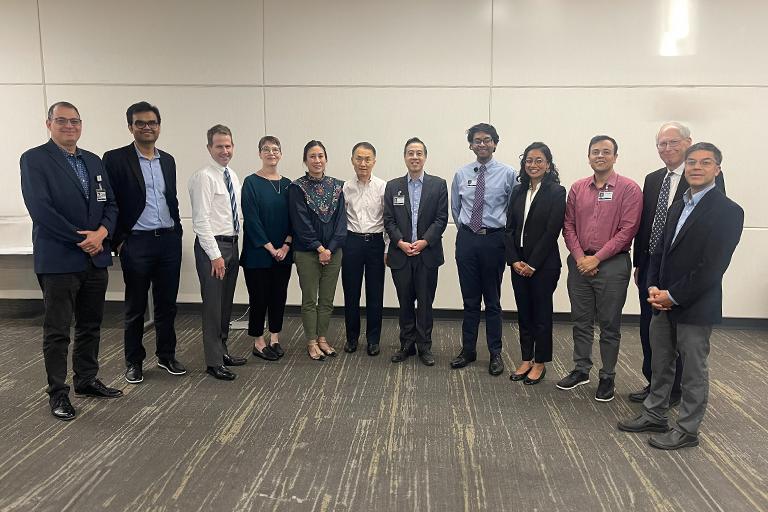
A two-day collaborative event, hosted by Dr. Thomas Wang and Dr. Ambarish Pandey from UT Southwestern Medical Center's Cardiometabolic Research Unit (CMRU), brought together a distinguished group of clinician-scientists and researchers. The gathering assembled experts who have developed a robust clinical research effort focused on tackling the complexities of heart failure and its translational research applications. With years of collaboration, the attendees have achieved national recognition through publications, grants, and impactful translational science in the broad field of cardiometabolic research.
The event boasted an impressive lineup of participants, featuring Dr. Anubha Agarwal and Dr. Mark Huffman from Washington University in St. Louis, Dr. Deepak K. Gupta from Vanderbilt University Medical Center, and several esteemed colleagues from UT Southwestern, including Dr. Neil Keshvani, Dr. Lindsay Cowell, Dr. Chul Ahn, Dr. Mark Drazner, Dr. Vinayak Subramanian, and Dr. Michael Mitakidis. The group was further enhanced by the presence of Dr. Priscilla Hsue from UCLA. This diverse assembly of experts engaged in innovative discussions and explored potential new collaborative projects, aiming to address complex issues in heart failure and related fields.
July 28,2024
Biorepository Team Plays Crucial Role in Clinical Trials
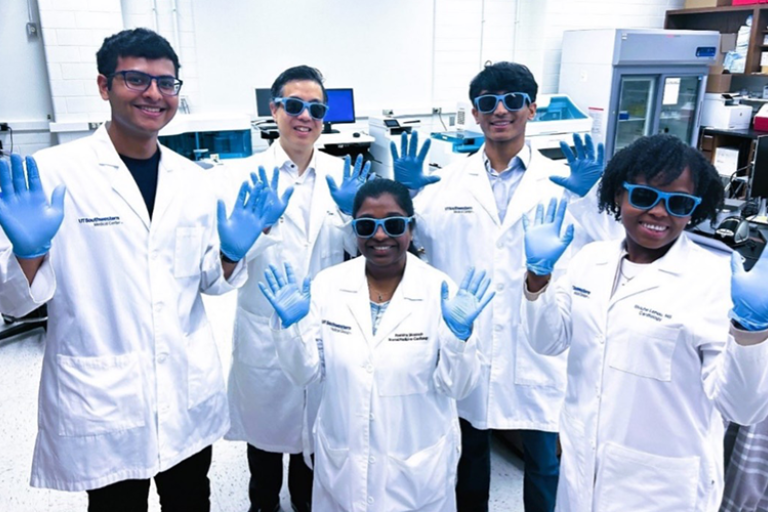
The Cardiometabolic Research Unit (CMRU), under the direction of Thomas J. Wang, M.D., Professor and Chair of Internal Medicine, and Ambarish Pandey, M.D., M.S.C.S., an Associate Professor in the Division of Cardiology, maintains a large biorepository of samples of blood and urine, in addition to COVID-19 specimens and a collection from the heart failure biobank. “Our biorepository plays a crucial role in supporting our research by providing high-quality samples for numerous studies,” says Elviche Lenou, M.S., a Senior Research Associate in the CMRU. “Additionally, it ensures the integrity and reliability of the data generated from these samples, which is essential for advancing our understanding of cardiometabolic diseases.”
The team is responsible for several essential tasks to ensure seamless operations. They maximize the use of freezer space, monitor temperature control systems, and perform regular maintenance and servicing of freezer units. Additionally, they manage inventory levels and track product expiration dates to reduce waste. The team also coordinates with suppliers for timely restocking and promptly addresses any equipment malfunctions. Furthermore, they enforce strict safety protocols to maintain quality. “By maintaining a diverse collection of biospecimens, we will be able to track health outcomes over time and study the progression of various diseases, ultimately contributing to improved public health strategies and interventions,” Dr. Pandey says.
Read more in Medicine Matters
July 12,2024
CMRU's Cardiometabolic Lecture Series on Guideline Directed Medical Therapy for Heart Failure & the Kidney
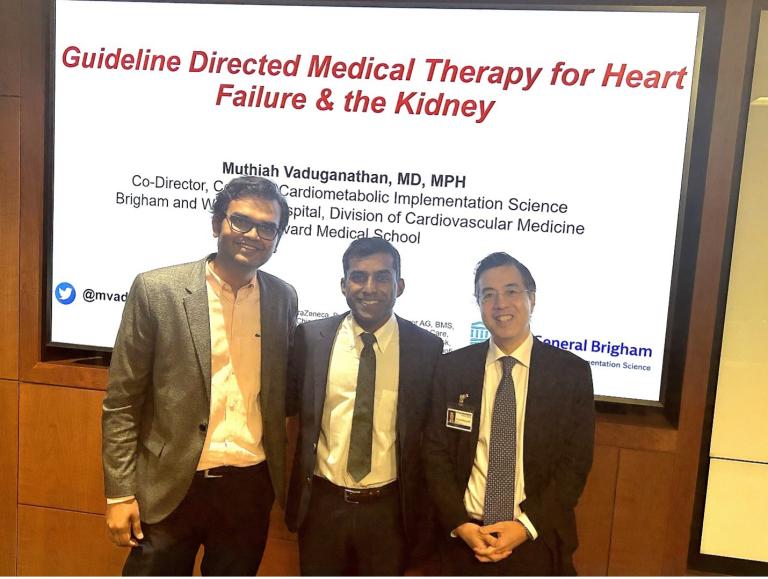 L-R: Drs Pandey, Vaduganathan, and Wang
L-R: Drs Pandey, Vaduganathan, and Wang 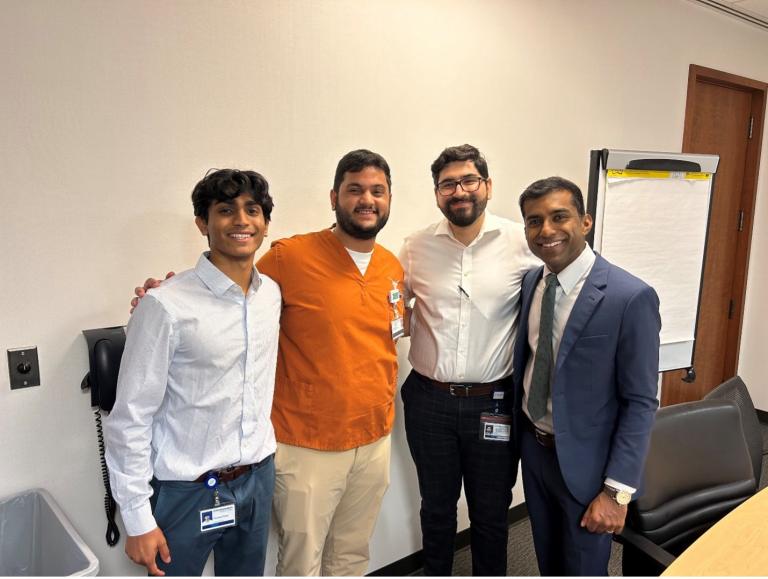 Engaging with enthusiastic researchers. L-R: Thomas Philip, Anand Jain, Drs Coellar Pauta, and Vaduganathan
Engaging with enthusiastic researchers. L-R: Thomas Philip, Anand Jain, Drs Coellar Pauta, and Vaduganathan Our guest Dr Muthu Vaduganathan, a cardiologist and trialist at Brigham and Women’s Hospital, emphasized the complex interplay between cardiac and renal function, underscoring the need for comprehensive treatment strategies by implementing evidence-based therapies in heart failure management. His presentation highlighted that heart failure medications, including beta-blockers, ARNIs, MRAs, and SGLT2 inhibitors, are safe and effective for patients with reduced kidney function, even at lower eGFR thresholds. These treatments can modify heart failure progression and are safe with close monitoring as kidney function declines. ARNIs and SGLT2 inhibitors also slow kidney function decline and reduce significant kidney events, with effective options available for managing HFmrEF and HFpEF. In his concluding remarks, he promoted enhanced cooperation between cardiologists and nephrologists to deliver cohesive, integrated care for patients dealing with heart and kidney conditions.
March 26, 2024
CMRU Recognized by Area Nonprofit for Team Excellence
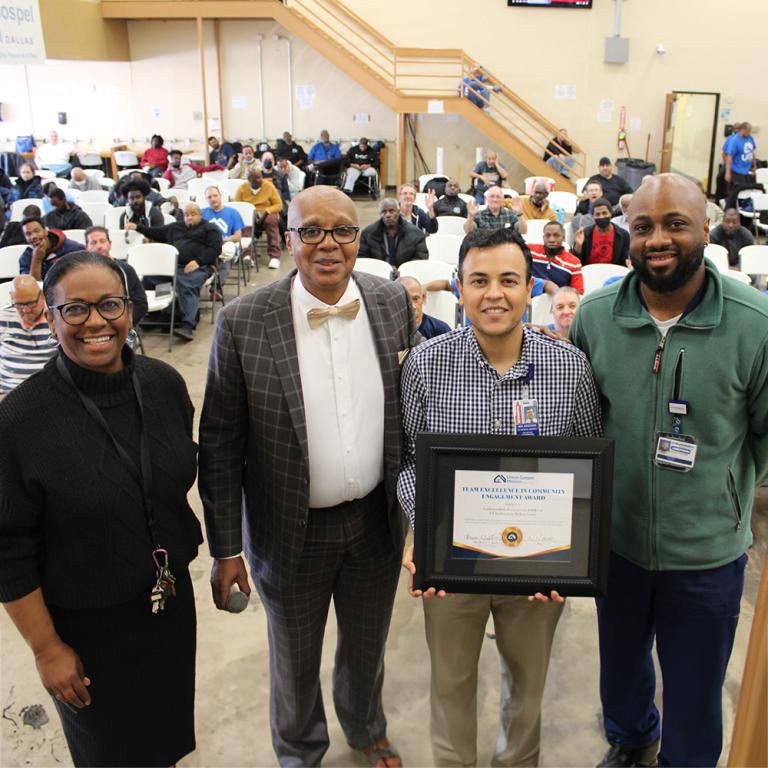 From left, UGM Volunteer Coordinator Tonya Johnson, UGM CEO Bruce J. Butler, Neil Keshvani, M.D., and Daniel Ayodel, M.B.S.
From left, UGM Volunteer Coordinator Tonya Johnson, UGM CEO Bruce J. Butler, Neil Keshvani, M.D., and Daniel Ayodel, M.B.S. In October 2023, members of the laboratory conducted comprehensive cardiovascular health screenings, education, and nutritional guidance to over 200 individuals at Calvert Place. The shelter serves adult homeless men and veterans ages 18 and older. Staff members work to address the diverse and sometimes critical needs of each person they serve by providing hot meals, a comfortable bed, clothing, a warm shower, health and mental health clinics, and daily spiritual services.
“Our entire laboratory collaborated in planning and executing this project,” says Michael Mitakidis, M.D. “Dr. Neil Keshvani, a Cardiology fellow and postdoctoral researcher in the lab, assumed the medical leadership role, ensuring that cardiovascular risk assessments were meticulously defined and administered. During the patient education session, he emphasized cardiovascular risk and self-care. Following this, Daniel Ayodele, our Clinical Research Coordinator, orchestrated a comprehensive health-screening maze in the shelter’s hall, with CMRU's team members carefully recording screening results for the cardiovascular risk report as residents moved through various stations. At the final station, residents engaged in discussions about their screening findings with our clinicians.”
March 8, 2024
CMRU's Inaugural Lecture Series on Novel Therapeutic Approaches to HFpEF
 From L-R: Drs Pandey, Fudim and Wang
From L-R: Drs Pandey, Fudim and Wang The lecture series was launched with Marat Fudim, MD, MHS, an Associate Professor in the Division of Cardiology at Duke University, serving as the first guest speaker. Dr. Fudim shared valuable insights on innovative treatments for HFpEF. He emphasized the urgency of addressing HFpEF on a national level and highlighted the importance of managing comorbidities to enhance treatment effectiveness. Dr. Fudim also discussed how the growing availability of monitoring devices is being leveraged for patient treatment, increasingly in remote settings. He concluded by underscoring the significance of cardiometabolic drugs as transformative treatments tailored to specific patient categories and types.
February, 2024
Our Harbor-UCLA Practicum in Cardiopulmonary Exercise Testing Experience
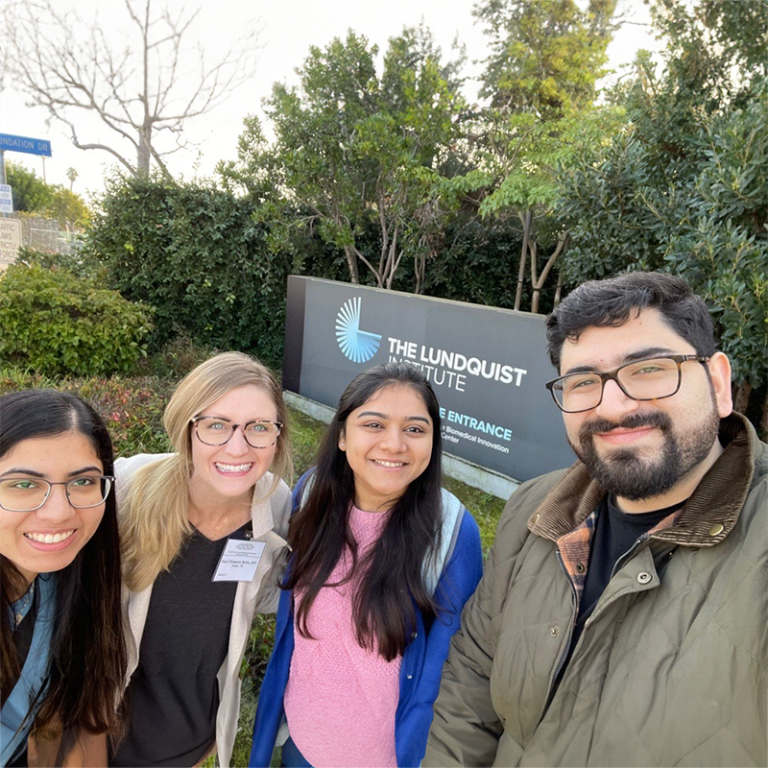 Well done team (L-R): Lajjaben Patel, Traci Betts, Ritika Dhruve, Juan David Coellar Pauta
Well done team (L-R): Lajjaben Patel, Traci Betts, Ritika Dhruve, Juan David Coellar Pauta Back in 1982, Drs. Karlman Wasserman and Brian J. Whipp launched something special: The CPET Practicum! Since then, this program has evolved to keep pace with advancements in technology and changes in clinical practice and sports medicine, all while maintaining a steadfast focus on exercise physiology. Over two and a half days, we as participants engaged in a dynamic blend of in-person didactic presentations, laboratory demonstrations, and engaging group discussions.
Throughout the Practicum, clinical case examples are skillfully woven into the fabric of learning, highlighting key concepts, demonstrating the practical application of CPET, and explaining an accurate approach to data summary and interpretation. The educational goals are twofold: to deepen understanding of the physiologic basis of gas exchange responses to exercise and to empower participants to effectively utilize CPET variables to characterize exercise function in both health and disease.
This enriching experience is tailored for physicians, scientists, laboratory personnel and physical therapists actively engaged in cardiopulmonary exercise testing. It was one of the most comprehensive training experiences so far.
Our team focuses on understanding how 'Heart Failure with Preserved Ejection Fraction' (HFpEF) impacts patients, using Cardiopulmonary Exercise Testing (CPET) as a key tool. This practicum will help us improve our lab's efficiency and hopefully uncover new insights that can directly benefit patient care. We aim to bridge the gap between research and practice, aiming to improve outcomes for individuals with HFpEF.
November, 2023
CMRU news events in November
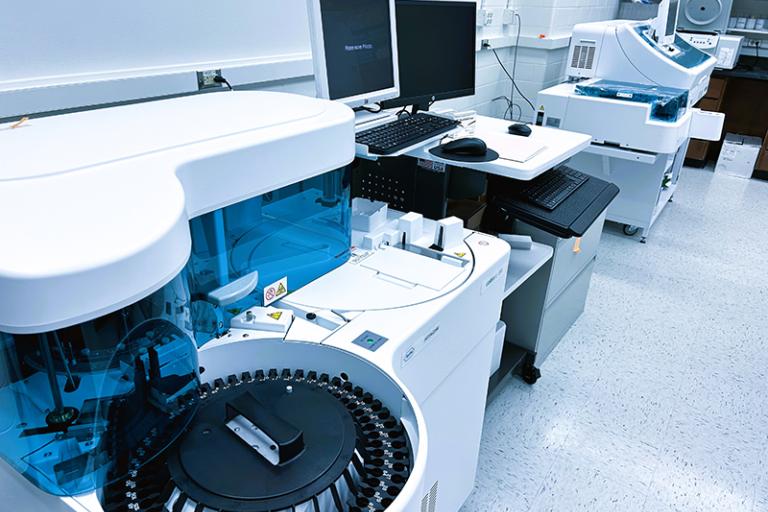
June 15, 2023
CMRU launches its own analytical wet lab and biorepository!
Designed, and renovated within 4 months, the CMRU Analytical Laboratory opened its doors in early 2023. The Multi-PI clinical research laboratory facility is equipped to provide the latest technology and clinical testing services to UTSW investigators. Analyzers onsite include:
The Roche Cobas c 311 analyzer which is an automated, software-controlled system for clinical chemistry analysis. It is designed for both quantitative and qualitative in vitro determinations using a large variety of tests for analysis
The Roche Cobas e411 analyzer, is a fully automated analyzer using a ElectroChemiLuminescence (ECL) technology for immunoassay analysis.
The VerifyNow system that provides an easy, rapid, and proven solution to assess platelet reactivity to antiplatelet medications.
In addition to processing and comprehensive testing on-site, the facility recently launched a state-of-the-art biobank that collects, catalogs, and stores human biological samples such as whole blood, plasma, and serum for research. A seamless barcoded cryo-storage datamatrix coding platform is used to enable safe sample identification. The specimens are earmarked for key trials and projects with significant future impact.
May 9, 2023
Racial disparities exist in use of statins to reduce heart disease risk, UTSW study shows
Black and Hispanic adults are significantly less likely to take statin drugs for preventive measures compared with white adults.
Find out more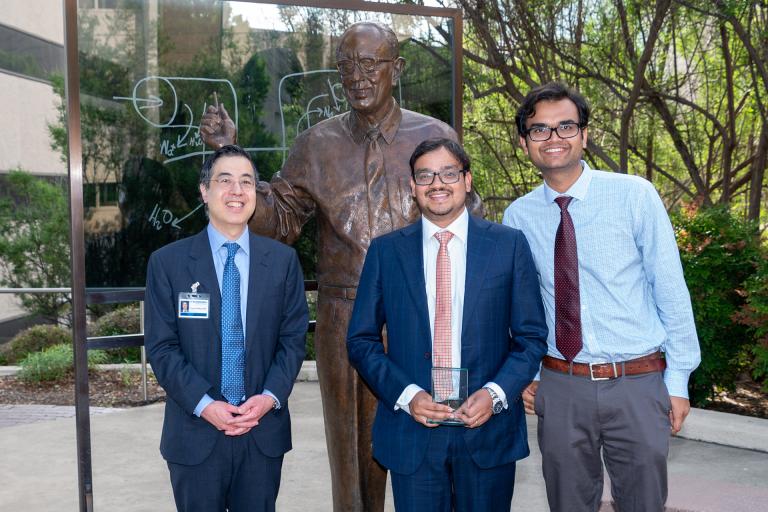
May 5, 2023
Dr. Sumitabh Singh selected as a Foster Fellow
Dr. Sumitabh Singh, a CMRU alumni, was selected as a Foster Fellow at the recently concluded Seldin Symposium. The Donald W. Seldin Research Symposium is the annual showcase research event of the Department of Internal Medicine at UT Southwestern Medical Center. Highlighting the tremendous research activity of Internal Medicine residents and fellows. The CMRU had a strong showing at the symposium with seven abstracts presented by CMRU fellows.
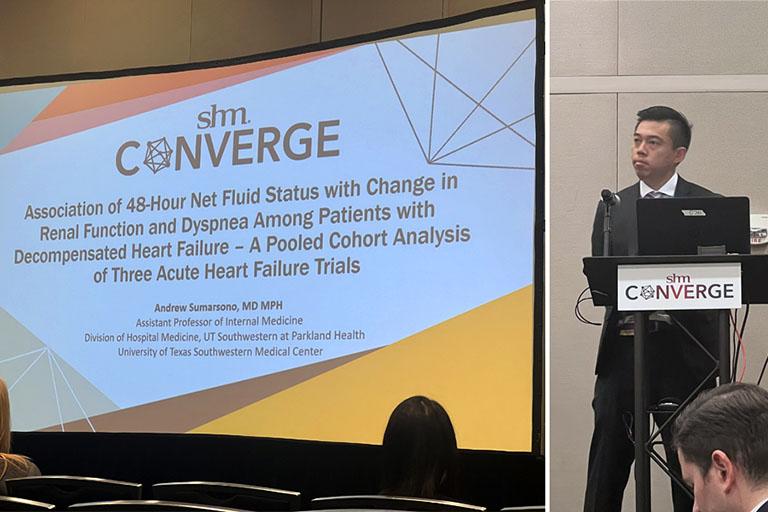
March 26, 2023
Dr. Sumarsono presents recent data at SHM Converge 2023
Dr. Sumarsono gave an oral presentation at the Society of Hospital Medicine Converge 2023, the national conference for academic hospital medicine recently held in Austin, Texas. The session was attended by academic hospital medicine leaders from around the country and was well received. His work has since been published in the Journal of Hospital Medicine: "Association of 48-h net fluid status with change in renal function and dyspnea among patients with decompensated heart failure: A pooled cohort analysis of three acute heart failure trials”
View Publication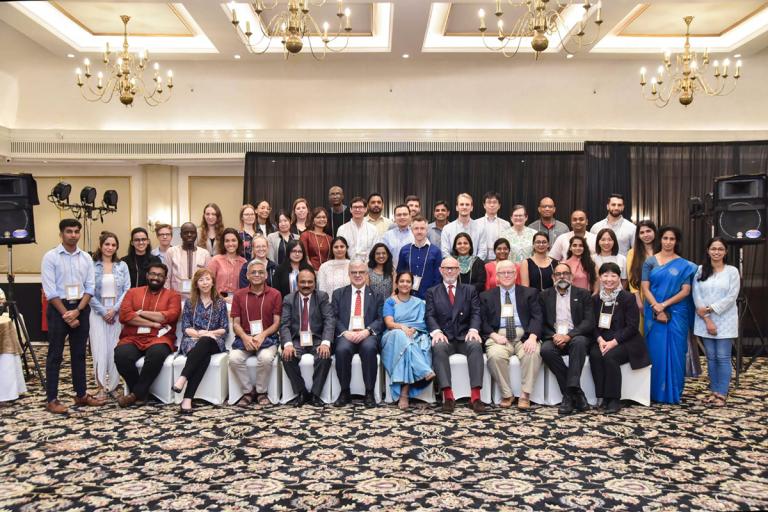
December 11-22, 2022
International Teaching Seminar on Cardiovascular Disease Epidemiology and Prevention
Lajjaben, a postdoctoral researcher in our lab, attended the 52nd Ten-Day International Teaching Seminar on Cardiovascular Disease Epidemiology and Prevention from December 11-22, 2022 in Kochi, India. This seminar was aimed to encourage epidemiological research in the field of cardiovascular diseases and up-skill physicians and researchers. The seminar included a series of lectures, group discussions and excursions to the city of Kochi. It also provided a fantastic platform to network with accomplished researchers around the world.
November 6, 2022
Dr. Matt Segar named winner for AHA Samuel A. Levine Early Career Clinical Investigator Award
Matthew Segar, MD, MS, a Texas Heart Institute Cardiology Fellow, has been selected as the winner of the Samuel A. Levine Early Career Clinical Investigator Award competition by the American Heart Association’s Council on Clinical Cardiology (CLCD) for his presentation “Development and Validation of a Phenomapping Tool to Identify Patients With Diuretic Resistance in Acute Decompensated Heart Failure: A Multi-Cohort Analysis.”
The Samuel A. Levine Early Career Clinical Investigator Award recognizes and rewards innovative clinical research by early career investigators and trainees and promotes careers in clinical cardiovascular investigation. The award is named for Samuel Albert Levine, MD, an American cardiologist. Dr. Levine was a pioneer in the treatment of coronary thrombosis.
July 14, 2022
UT Southwestern team wins grand prize in American Heart Association Data Challenge
A team led by UT Southwestern Medical Center cardiologist Ambarish Pandey, M.D., was awarded the grand prize in the American Heart Association Heart Failure Data Challenge hosted by the American Heart Association and the Association of Black Cardiologists. The six-month data challenge asked researchers to test the relationships between heart failure and health disparities, social determinants of health, and structural determinants of health.
Find out moreJune 3, 2021
Pandey wins NHLBI Big Data Analysis Challenge for heart failure research
Dr. Ambarish Pandey, Assistant Professor of Internal Medicine and a Texas Health Resources Clinical Scholar, is using big data to improve diuretic resistance among patients with acute heart failure.
Find out moreMedia
May 5, 2023
Frailty Linked to Heart Failure in Patients with T2D
For a study published in the Journal of Gerontology: Medical Sciences, Dr. Pandey and colleagues sought to evaluate whether frailty was an independent risk factor for HF in T2D. “This would help us better understand whether frailty can be targeted for interventions in future research,” Dr. Pandey says.
The Samuel A. Levine Early Career Clinical Investigator Award recognizes and rewards innovative clinical research by early career investigators and trainees and promotes careers in clinical cardiovascular investigation. The award is named for Samuel Albert Levine, MD, an American cardiologist. Dr. Levine was a pioneer in the treatment of coronary thrombosis.
Physician's Weekly
March 22, 2023
Black, Hispanic adults are less likely to get statins for heart disease, study finds
Black and Hispanic adults in the US are less likely than White adults to get statins, medications that prevent or treat common forms of heart disease, according to a new study.
For the study, published Wednesday in the journal JAMA Cardiology, the researchers analyzed data on more than 3,000 people ages 40 through 75 in the United States, broken down by their risk of developing atherosclerotic cardiovascular disease, also known as ASCVD, over a 10-year period. Just over 10.7% were in the highest-risk group, with a risk at or above 20%.
CNN
August 26, 2022
How to Get Heart Patients to Take Their Pills? Give Them Just One.
Patients given a combination “polypill” after a heart attack were more likely to stick to their regimens, researchers reported.
The New York Times
March 11, 2022
Guideline-Directed Therapies Underused in Frail HF Patients
Optimal guideline-directed medical therapy (GDMT) is prescribed less often in frail patients with heart failure with reduced ejection fraction (HFrEF) than in nonfrail patients, and they may be more likely to die or be hospitalized as a result, an analysis from the GUIDE-IT study shows.
“There's a big implementation gap in getting these therapies to patients who are high-risk and who need them the most,” senior author Ambarish Pandey, MD, MSCS (University of Texas Southwestern Medical Center, Dallas), told TCTMD. “The first step would be to identify frail patients in our clinical setting, which we don't do a good job of, and I think that's where we need to start.”
TCTMD
